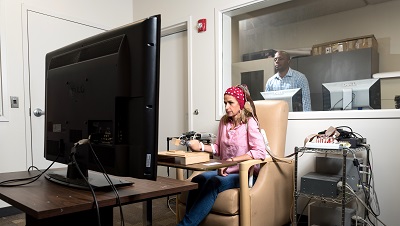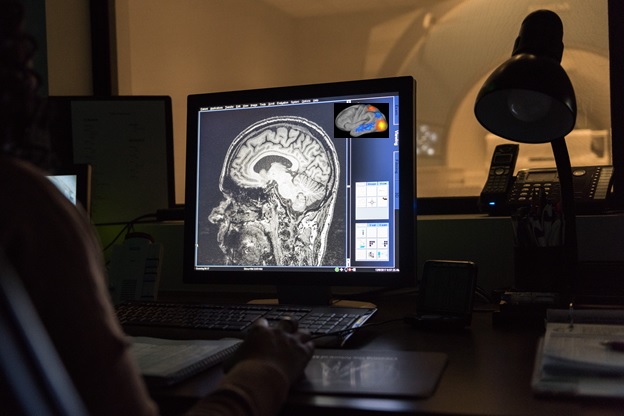
Human Motor Control
Understanding the complexity of human motor systems involves a deep understanding of the anatomical and physiological systems within the neuraxis that help to coordinate behavior. This, by necessity, involves human neuroscience approaches covering the lifespan. Research is revealing developmental processes in motor learning that can address basic science discoveries into understanding and enhancing the human ability to increase motor skill. Studies are discovering how the nervous system optimizes for goal-based motor learning in the upper and lower extremities. This, by necessity, involves a deeper understanding of how the nervous system interacts with the skeletomuscular system to support movement. The specific research questions REU students may address include:
- What properties distinguish neural networks through adolescent development?
- What is the physiological relationship between brain and muscle as motor skill develops?
- Can phases of motor learning be predicted and influence to enhance or disrupt skill acquisition?
- How does goal setting translate into refinement of cognitive-motor circuits for motor control?
- How does motor-optimality principles translate into descending central neural signals, and to what extent is this rooted in ascending feedback?
- How does motor control inspire human augmentation technology (e.g., exoskeletons) modify corticospinal connectivity?
- How does the will and desire to act effect neuromotor facilitation?
Faculty mentors involved in this area: Chang, Prilutsky, Shinohara, Ting, Wheaton,
Cognitive Processing
Complex interactions across the brain allow us to perform cognitive functioning across domains such as perception, attention, memory, and decision making. While discovery of the mechanisms of these processes is critical, understanding the developmental emergence of cognition is also of ongoing interest. Projects throughout the lifespan involve the role of neural activity in the medial temporal lobes in generating long-lasting memories, neural circuits connecting these regions to frontal, parietal, occipital and other temporal regions to subcortex and motor cortex to aid control of behavior and the cognitive-motor circuits that affect motor planning and task selection and brain states related to decision making. Further work in this space involves evaluating pathways for encoding memories through the natural lifespan. Research in neuroadaptive processes in cognition invariably relates to important basic science discoveries with clinical relevance. Ongoing work in this space is seeking to understand neuroadaptive processes that can positively impact cognitive systems in rehabilitation. Further work seeks to better understand the basic mechanisms of how neural adaptations to injury can affect neural pathways involved in sensory, cognitive, and motor processes. The specific research questions REU students may address include:
- How does emotion affect neural processing of memory, attention, and other processes?
- How do humans use signals from their environment to adjust their attention and memory systems?
- What neural systems are engaged in using memory and perception to arrive at decisions?
- What is the relationship between brain network architecture and cognitive ability?
- Can we develop computational models of perception to inform about processing in areas such as prefrontal cortex?
- How does brain systems allow us to navigate in complex environments?
- How do lifestyle changes through aging affect neural systems for cognition?
Faculty mentors involved in this area: Brown, Dhamala, Dotson, King, Rahnev, Schumacher, Wheaton, Wheeler
Human Neurophysiology
The human nervous system also integrates with all physiological systems, and responds as the body responds. Work in this area seeks to understand how the brain anatomy and physiology interacts with other systems, and how stressors can affect brain function. Critical work in revealing is underway revealing how genetics impacts brain function. Natural physiological stressors such as heat, hydration, fatigue, and stress can significantly affect behavior which is thought to have a central mechanism yet to be well understood. Also, physical injury, such as falls and concussion can affect the nervous system physiology in complex ways. Work is seeking to not only understand how the nervous system is affected by these events, but also how the brain can compensate for these stressors to support a maintenance of function. The specific research questions REU students may address include:
- How do fluctuations of brain activity affect neural processing during cognitive and motor tasks?
- How does economic vulnerability affect brain function and anatomy?
- Can biomarkers reveal patterns of genetic effects on brain structure and function in chronic disease?
- How does pharmaceutical treatment of cognitive conditions affect neurophysiological and anatomical processes?
- How does concussion affect biomarkers of neurological health, and can factors such as hydration ameliorate risk factors?
- Can wearable biosensors detect metrics of neurophysiological stress to predict cognitive decline?
- What are the functional and structural injury thresholds of the human brain to withstand acute trauma?
Faculty mentors involved in this area: Brown, Dotson, Dhamala, King, Pardue, Rahnev, Schumacher, Turner, Ware, Wheaton

